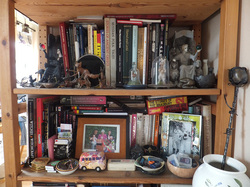 To be or not to be with Clutter. There are so many Professional Organizer terms, thoughts, ideas and philosophies about why people have so much clutter and can't control it. Personally I believe clutter is comfort and discomfort all in one. It is a love / hate relationship with our stuff that is created as an easier love / hate relationship than with friends, family or people or relationships. Otto Rank was the person that started to understand how people perceived objects or even images in their mind to take the place of a personal relationship with mother or father, while Fairbairn coined the term "object relations". Melanie Klein a psychoanalytic genius theorist started to understand infants relationships with their mother's parts, and recognized that babies eventually realized that the breast, the child had been sucking on and having a relationship with, was part of the mother as a whole. The "independent" breast was initially the love object of the child, and not necessarily the mother in total. So as a theorist myself I surmise that as soon as the child realizes the breast is part of the mother, and has any contention with the mother, the breast is not as exciting, as it becomes associated with the mother. Next, as you can surmise, any objects including bottle, bears, toys, teething rings, dolls, toy soliders, balls, puzzles and keys become the next independent objects the child loves. These objects are given to the child from the parents, but are not part of the mother or father, yet are controlled by the mother or father. So a new relationship forms with "independent" objects, although the objects, at the parent's discretion, turn up or slip away without the child's control. This lack of control over their loved objects make the child feel powerless at times and annoyed and frustrated so much so that when the love object returns there may be an unhealthy attachment that starts to form. We all know the "blankie, or binkie, or snuggly" blanket theory. Baby child is given a blanket to "comfort" them. Then the parents, at their own will, when recognizing the child's love attachment, to the blanket, may manipulate the blanket, as a tool, for conditioning the child to be obedient, furthering the unhealthy attachment to the blanket. The objects for children can be soothing to the child and an ally against the unhappiness the child feels with the parent training tactics. T As the child gets older television, video games and phone become the number one object of focus and love for the child. If you think of Television as a "controlled substance" you can see clearly how the parent / child relationship surrounding watching t.v. can be distressed and disturbed. Obviously putting children in front of a TV or video game instead of healthful, mindful and playful interaction with the parents is a very bad idea. We now are a society that finds GREAT comfort with television. Television in small doses and with very creative programming can be a fun and delightful thing, but when it is about watching mindless, soap-operaish, drama wrenching stupidity it is definitely robbing your life away. In fact given a choice to choose Television over any other objects, in the long run T.V. would probably win. In severe cases of object attachment there are people with significantly unhealthy relationships with objects. The objects have become allies against every person that is in their life or enters their life. The objects don't allow the home to be cleaned, they cause dangerous pathways, or no pathways. The objects become broken and pose possible injury, or they become dust suffocation objects. I have had numerous clients on breathing machines due to lung damage from all the dust their loved objects collect. So in essence the things they love the most are killing them literally. The blind love of the objects is like a person having a relationship with a batterer, becoming a victim of addiction and affliction. To have a home pile up, not be able to use the kitchen, the living areas and sometimes not even the bathrooms, but still go on living life as if nothing is wrong is denial in a large form. The people with object attachment often don't really care about their objects as much as they care about having them. They love the stuff they collect and they have so much of it that they can't even find the things they love the most. And in my research with the people that over-collect and make a big mess I get the love of stuff and the object attachment. If matter did not matter we would all live in Teepees and have a drum and skirt on with a possible peace pipe or two. Not to knock the American Indian lifestyle, as I am moving towards minimalism, but most people would eventually miss their bed, their couch, clothes, toys and their T.V.. So the work I have been doing with people that have "object attachment" as I call it, are working on identifying objects that are truly sentimental, or purely attachment, memory invoking, and or that have a real pull on them so they can go to the next step. They also realize the difference between needing to breathe, eat, sleep, get sun, eliminate, drink fluids and have shelter versus wanting things. They understand that NO objects are needs. The next step they realize is that the objects that trigger their emotional body never filled the hole of having inadequate relations with their mothers, fathers, brothers, sisters, friends and loved ones. The dolphins, cows, bears, jewelry, purses, shoes, clothes, books, records, papers are NOT GOING TO FILL THEM UP. Then we symbolize the objects. Usually the dolphins mean frolic and play they are missing with others, the cows are the way they feel, happy, tail waving in the wind, but often eaten and ravaged. Bears replace the cuddling they are not getting or never really had, jewelry means they are rich and cherished, purses are about prestige and status and shoes about grounded and established, clothes are "I will be prettier or more handsome", records are "I'm interesting and or isolative and don't need anyone, but my music" and papers, well papers are "I will gain more knowledge and be smarter or informed". These are just examples and not how everyone would symbolize their own objects. Symbolism must come from the person, not from the Organizer or Coach. Next we talk about a reasonable amount of stuff for one person. What is a reasonable amount of clothing for a retiree who rarely socializes? What is a reasonable amount of books for someone not currently reading and addicted to television? What is a reasonable amount of jewelry, bags and shoes for someone not earning a large income and has spending challenges? What are a reasonable amount of t-shirts for a woman of leisure? So most of the responses are "I will get to the objects someday?" My response is "when?" Then we agree on a reasonable amount of time it will take for them to realize the relationship they are having with the object and if it "space worthy". Like Elaine on Seinfeld understanding if a date was "sponge worthy" we look at objects to see if they are "space worthy". "Space worthy", meaning does it belong in your real estate? Defining the objects worth is worthy of your time. The decision about what to do with stuff is the biggest challenge with people who accumulate too much for their spaces. I mean, Candy Spelling had a doll collection that was housed properly in a gazillion square foot room of her home. She had ample space for her dolls and they were all organized and categorized. The problem is that the average person does not have the luxury of that kind of space. So I tell the person "your stuff is "taking up your real estate". But still the attachment is there with the objects. So I get that nod of understanding that the objects are crowding them out of their space, but with no understanding of how to organize their spaces. What helps a person with lots of objects and a lack of organization skills is understanding what is precious to them and what they have tired of. Finding objects in back of closets, under beds, in corners usually is a sign they tired of the object. Although delighted to see their object again, and of course the standard "I was looking for that", or "Oh that's where you were" statement they usually acknowledge that they had tired of that particular thing. Then there are the random objects they purchased or accumulated from others deemed O.P.S. (other people's stuff) that they are really not that attached to. Breaking attachment challenges to objects is no easy task and can't be undone in a day, so helping cluttered people and their spaces part with a 1/3 of their belongings is an achievement. Parting with the items that do not trigger large emotional responses is usually easy for people. We talk about what is valuable (heirloom or just expensive and could fetch a pretty dollar), really meaningful (letters from a parent who died, or yearbooks, or moments), purposeful (things we all use on a regular basis, pens, paper, recipes, clocks, furniture, kitchen utensils, electronics), we talk about what is excess and that helps people make good decisions about what they keep, and why and what they do with it. Then the last part of understanding what to do with the prized objects, after a good editing without any regrets, pushing or prodding, since the organizer or coach does not want to re-create the same parent / child type of object manipulation relationship over again, the objects, can become manageable with some great space planning, bringing in armoires, cabinets, drawers and proper space and containment for their goods. Pushing and prodding are replaced with thought provoking statements such as "tell me about this?" or "what does this symbolize?" or "what is a reasonable amount?" or "will this object fill your hole and make you whole again?" and "what will make you feel whole and happy again beside these objects?" is a great way to a clutter free space. Marla Stone, MSW, Retired LCSW, Professional Organizer, Lifestyle Coach, Décor and Feng Shui Specialist is here to help you to find your ideal lifestyle. www.i-deal-lifestyle.com
0 Comments
|
Professional Organizer BlogMarla Stone of I-Deal-Lifestyle™Professional Organizer writes about how to improve your life by improving your environment and how to improve your environment by improving your life Archives
September 2018
Categories
|



 RSS Feed
RSS Feed